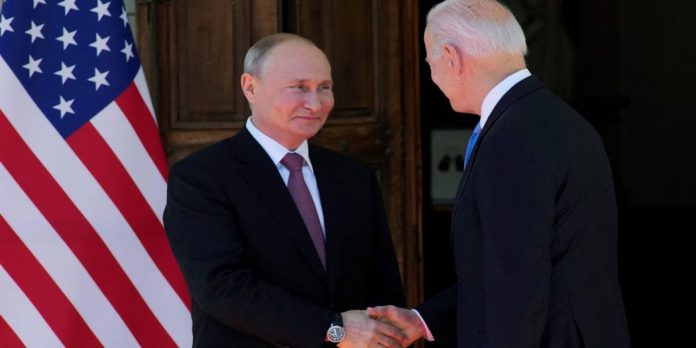The summit started with a chaotic scene, with Russian security shoving members of the media.
President Joe Biden and Russian President Vladimir Putin entered the second phase of their highly anticipated summit meeting on Wednesday afternoon — diving into discussions on cyberattacks, human rights, election interference and other pressing issues with a broader group of top officials from Washington and Moscow.
The expansion of the summit came after an initial session between Biden, Putin and their respective countries’ top diplomats, which lasted roughly an hour and a half. Both meetings are expected to take a total of roughly four to five hours and will be followed by individual news conferences with the two leaders.
At their first appearance together on Wednesday, Biden and Putin flanked Swiss President Guy Parmelin at the front door of the historic Villa La Grange, remaining stone-faced as their host welcomed them to “the city of peace” — where Ronald Reagan and Mikhail Gorbachev held their first Cold War-era summit in 1985.
“I wish you both a fruitful meeting in the interest of your two countries and the world,” Parmelin said, stepping away and allowing the two leaders to greet one another. Biden and Putin locked eyes, shook hands and appeared to exchange brief pleasantries before entering the massive estate situated on the banks of Lake Geneva.
Biden and Putin were seen again a few minutes later — seated next to Secretary of State Antony Blinken and Russian Foreign Minister Sergey Lavrov, respectively — inside what appeared to be a vast library within the villa. A globe was positioned directly between the two leaders, with large American and Russian flags erected on either side.
Their remarks were difficult to make out over the din of assembled journalists, but Putin thanked Biden “for the initiative to meet today” and said he hoped their summit “will be productive.” Biden, in turn, responded: “As I said outside, I think it’s always better to meet face-to-face.”
The four men, accompanied by translators, were mostly expressionless throughout the photo opportunity, although Biden did crack a smile as reporters jostled for better positions.
The throng of press covering the summit quickly devolved into a chaotic scene, with Russian security shoving members of the media while reporters and White House officials screamed at Putin’s forces for their treatment of the journalists. One Russian media outlet, the state-owned RIA Novosti, blamed the scuffle on its U.S. counterparts, falsely reporting that “American journalists staged a stampede.”
Following the initial meeting of Biden, Putin, Blinken and Lavrov, the two leaders were set to be joined by four additional aides for an expanded second session. The U.S. delegation included National Security Adviser Jake Sullivan, Under Secretary of State for Political Affairs Victoria Nuland, U.S. Ambassador to Russia John Sullivan and National Security Council Russia director Eric Green.
Biden and Putin are expected to take breaks throughout the meetings as needed, but they will not share a meal together. “No breaking of bread,” a senior administration official said.
Biden’s aides said he plans to press Putin directly on a recent spate of cyberattacks, human rights abuses and a buildup of Russian troops on Ukraine’s border. But they also say Biden hopes to speak to him about areas where they might have common ground, including nuclear arms control and climate change.
Other potential topics of discussion include Moscow’s detainment of American citizens, including two former Marines, as well as the possible return of U.S. diplomats to Russia and vice versa.
“When the other side tries to say that there are issues that are off the table or that won’t be on the agenda, for the American president, nothing is off the table,” a senior administration official said. “Certainly human rights are not off the table, and individual high-profile cases are not off the table.”
Back home, the president has continued to face criticism from Republicans that the summit, first proposed by Biden, rewards Putin and elevates Russia to the same diplomatic playing field as the U.S. Even some Democrats are urging Biden to take a tougher line.
The White House has said it does not not expect the summit to produce to any major policy agreements, but argues it is the first step toward establishing a “stable, predictable” relationship with Russia and a personal dialogue between the two men, who last met a decade ago.
Biden, a former chairman of the Senate Foreign Relations Committee who often boasts of his expertise in diplomacy, has long expressed a distrust of Putin on the world stage.
“We’re not expecting a big set of deliverables out of this meeting,” the administration official said. “I think we expect that there will be areas where the presidents will task out further work to their teams.”
One small exception: Both Russia and the U.S. have left open the possibility that their ambassadors could return to each other’s capitals. The ambassadors came back to their home countries in the wake of U.S. sanctions on Moscow for the SolarWinds hack and the poisoning and imprisonment of opposition figure Alexey Navalvy. Russia levied a slate of reciprocal sanctions on Washington, but both ambassadors are now in Geneva on Wednesday for the meeting.
In recent weeks, Putin has continued to face allegations that he has amassed troops along the Ukrainian border, allowed Russian actors to engage in cyberaggressions, cracked down on political dissent and signed deals with Iran to provide them with satellite technology.
Earlier this week, Putin told NBC News he could not guarantee that Navalny, one of Putin’s fiercest critics, would leave prison alive. Navalny was sentenced to prison after returning to Russia from Germany in January following his recovering from poisoning with a nerve agent.
The Biden administration has imposed sanctions but members of both parties want him to do more on the Nord Stream 2 pipeline nearing completion, which will bring natural gas from Russia to Germany under the Baltic Sea.
The last four presidents have sought to re-engage with Russia to varying degrees and with limited success. George W. Bush infamously said he had looked Putin in the eye and peered into his soul. Obama dubbed his attempt a reset. In 2018, then-President Trump provoked a firestorm for blindly accepting Putin’s denial of election interference, countering multiple assessments by U.S. intelligence agencies, when the two leaders met in Helsinki.
Michael McFaul, the former ambassador to Russia under Obama, who was present during Biden’s last meeting with Putin in 2011, said Biden needs to be careful about Putin’s tendency to equate his own behavior with those of others.
Biden aides say the president will outline areas of America’s vital national interests and will convey that where Russian activities run counter to those interests, they will be met with a response.
“He’s been preparing for this like he prepares for every significant international engagement. He reviews the issues — written material; he cares about digging into the details,” the official said. “That very much matters to him. And he’s also had the opportunity to engage with a wide variety of reasons advisers across the government who have deep expertise on Russia, as well as to hear from some outside experts as well.”
After the meeting, Biden and Putin are each expected to hold separate news conferences. Biden will wait until Putin is finished before he begins. Late Wednesday, Biden is expected to return to Washington.
Source : Politico







